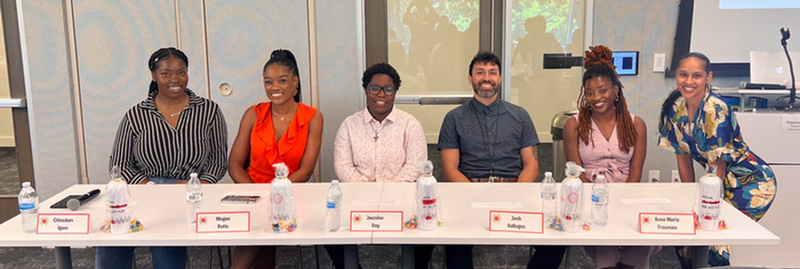“Returning to My Why”: Megan Potts Reflects on Leadership, Legacy, and Storytelling at City Year Dallas
When 2023 AmeriCorps Alums Segal Fellow Megan Potts returned to City Year Dallas as an alumni panelist, not just coming back to share advice but coming home to something deeper.
“Being back in that room, with over 50 new AmeriCorps members just beginning their service journey, I was reminded of the power of authenticity and connection,” Megan shared, reflecting on her experience. “Leadership isn’t just about position or experience. It’s about being real, being present, and sharing the path that got you here.”
The panel, supported by the Leadership Development Fund (LDF), offered Megan the chance to reconnect not only with her City Year roots but also with the values that continue to shape her as a servant leader.

“There was this really moving moment where I met a corps member from my hometown and another who had also gone to my alma mater—Florida A\&M University,” Megan said, her voice lighting up. “It reminded me that these invisible threads—of place, of experience—really do tie us together. Those connections made the moment feel so real and powerful.”
But it wasn’t about nostalgia. For Megan, the experience served as a grounding point where there's a chance to reflect on her growth, refocus her purpose, and offer that wisdom to the next generation.
“This space gave me time to revisit my ‘why.’ It helped me speak with clarity about my journey, and more importantly, to model transparency and resilience to those just starting theirs,” she explained. “When you’ve been through it, sharing your story becomes a tool to uplift others.”
The visit also included a trip to City Year headquarters, where Megan spoke with the graduating corps and visited the seat dedicated to Eli Segal. “That moment was surreal,” she reflected. “To sit with the legacy of Eli Segal and the impact he continues to have on this work. It was humbling and inspiring.”
Looking ahead, Megan is bringing the lessons of this experience back to her team and community. She's already planning a virtual convening in Fall 2025 focused on intergenerational wisdom sharing, and she’s reinvigorated to mentor City Year members and alumni, especially around themes of identity, purpose, and equity in career development.
She’s also committed to lifting up the Segal Program in her ongoing leadership work. “I want current AmeriCorps members to know about the Segal network—about the opportunities, the development, the family it offers.”
As she closes her reflection, Megan leaves with a note of deep gratitude.
“I’m thankful to the Segal Program for making this possible, and to City Year Dallas for the warm, affirming welcome. This work is ongoing—and I’m excited to keep showing up, grounded in kindness and clarity.”
Fellow in Action Highlights
Learn more about how our Segal Fellows are also making a difference across fields and throughout the COVID pandemic.
Segal Fellow COVID-19 Frontline Workers
Segal Fellows Election Spotlight
